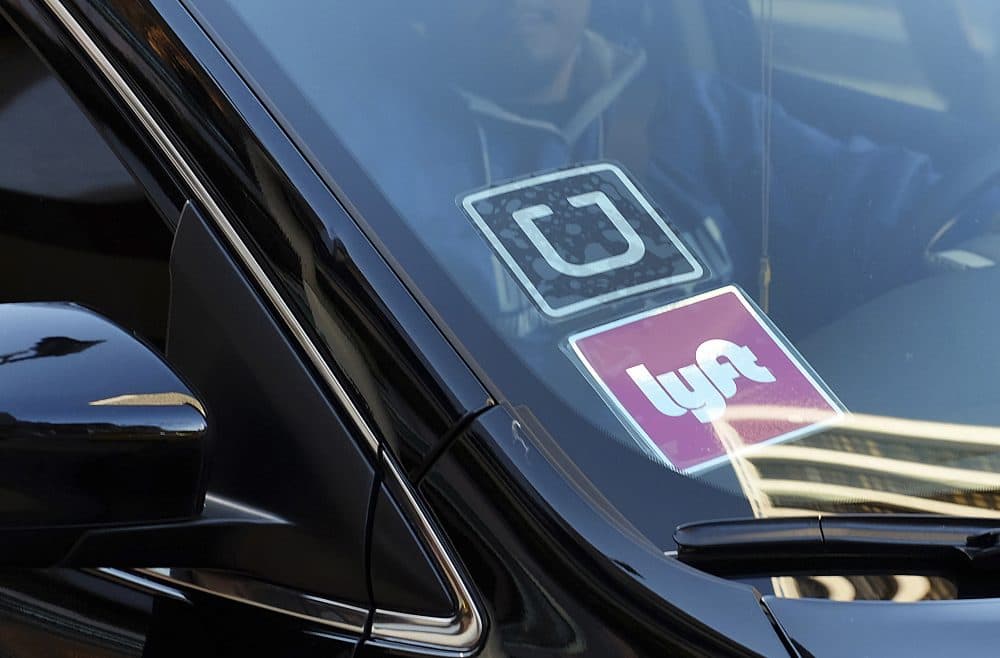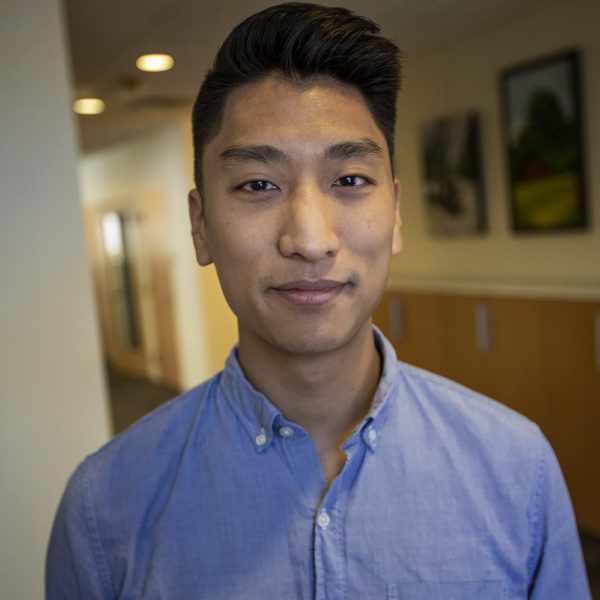Advertisement
Advocates For Uber And Lyft Drivers Urge Legal Action As Coronavirus Response Saps Ridership

Until recently, Joel Paul had a full-time job working for a political advocacy group. Then, about a month ago, he got laid off.
"Perfect timing for coronavirus to hit," Paul said.
He hadn't bothered to file for unemployment, "because I thought, 'Oh, I'll just switch to driving Lyft.' "
But almost immediately after he started driving full-time, the flow of people around the city slowed way down as the coronavirus started to hit. First, the colleges started closing.
"It's a significant drop just to have them gone," said Paul, who spoke over video chat recently while seated behind the steering wheel of his parked car. "Then on top of that, all the bars or restaurants are closed as well. It's catastrophic for anyone who's driving Lyft or Uber full-time."
Paul said his earnings from rides around Cambridge and Boston have dropped about 30% compared to what he made during previous weeks. And, he predicted, "it's going to get worse."
As public health experts continue to preach social distancing measures like avoiding gatherings with friends, governments close schools and restaurants, and thousands of people stay home from the office, Uber and Lyft drivers are experiencing a sudden downshift in business. According to data from the market research firm Edison Trends, both companies saw spending on rides fall about 20% between the first and second weeks of March.
To make things worse, Paul worries that when he is on the road, he risks catching or spreading the coronavirus.
Advertisement
Still, he's got bills to pay, and if he stops driving he’s not earning. So, what should he do? Stay home or get on the road?
"Aside from the public health crisis, this poses an economic crisis for drivers," said Henry De Groot, executive director of the Boston Independent Drivers Guild (BIDG). Because the companies classify drivers as independent contractors, drivers don't earn paid sick leave.
As a result, "[drivers] have to choose between their health and the health of Massachusetts, and being able to pay their mortgage, pay their rent, put food on the table," De Groot said.
Because of that, De Groot is among the driver-advocates looking to the legal system for help.
This week, BIDG sent a letter to Massachusetts Attorney General Maura Healy, asking her to take legal action against Uber and Lyft that would force the companies to recognize ride-hail drivers as employees who are entitled to paid sick leave. Under state law, companies with 11 or more must provide some sick time — time that may be used by employees to take care of themselves or certain family members.
"As many of the thousands of drivers in the state of Massachusetts live paycheck-to-paycheck already, the coronavirus pandemic puts drivers in an increasingly precarious position," De Groot wrote.
In response to WBUR's inquiry, the attorney general's office said that it has received the letter and is researching options for the drivers.
In recent days, Lyft and Uber have said they'll begin compensating some drivers who are affected by the coronavirus outbreak. However, their current policies only cover drivers who've tested positive for the virus or who've been placed under quarantine.
These policies do little to help drivers who believe they might be sick, but are not certain, said De Groot. Nor does it give older drivers who are at higher risk of developing severe symptoms in response to COVID-19 a reason to stay home.
"I would bet drivers have said, 'Well I can't get tested, and I don't know if I have coronavirus, but I know this bill is due next month. And I know that I need to drive to make money,'" De Groot said.
"This has been an enormous issue for years, and I'm hopping at the very least this crisis will bring that problem to light," said Shannon Liss-Riordan, a workers' rights attorney in Boston who is currently representing Massachusetts drivers in a federal class action lawsuit against Lyft and Uber. By the end of this week, Liss-Riordan said she plans to file an emergency motion asking the court to grant a preliminary injunction recognizing the drivers' right to paid sick leave.
Granting that request, however, would require the court to decide, at least temporarily, a question that Lyft and Uber have been battling against for years — whether their drivers can be classified as employees. And with economic relief packages currently churning their way through state and federal governments, it's not clear whether the attorney general or a federal judge would jump at the chance to do so.
“It’s an unusual motion to file in this type of case, but these are unusual times," said Tara Swartz, an employment lawyer in Boston who is not involved in the litigation against Lyft and Uber. "In my view, it would seem to be more effective to go with that plea to the legislature and say, 'Please don’t forget the gig workers, we're hurting, too.'"
But a legislative cure may not come soon enough, Liss-Riordan said. "These workers are on our front lines right now. They are out there getting people where they need to go ... they're bringing food to people's homes ... Amazon drivers are delivering Amazon packages to people who are stockpiling their pantries."
WBUR reached out to Uber and Lyft for this story. Only Lyft responded. According to a Lyft spokesperson, 90% of its drivers drive less than 20 hours per week, using Lyft to supplement their income, and 74% have other jobs in addition to driving on the Lyft platform.
Of course, judging by the stickers on many ride-hailing vehicles, plenty of drivers drive for both Uber and Lyft.
And the lack of sick pay forces people like Joel Paul, who drives full-time, to balance their bank accounts against their health.
"At this point, I'm looking at, more likely than not, that I'll just stop driving for the next few weeks," Paul said.
Without that income, he said, it’ll be hard. On the upside though, he’ll get to spend some quality time with his kid, who is also going to be home for a while, now that schools statewide have been temporarily closed.
This segment aired on March 19, 2020.
